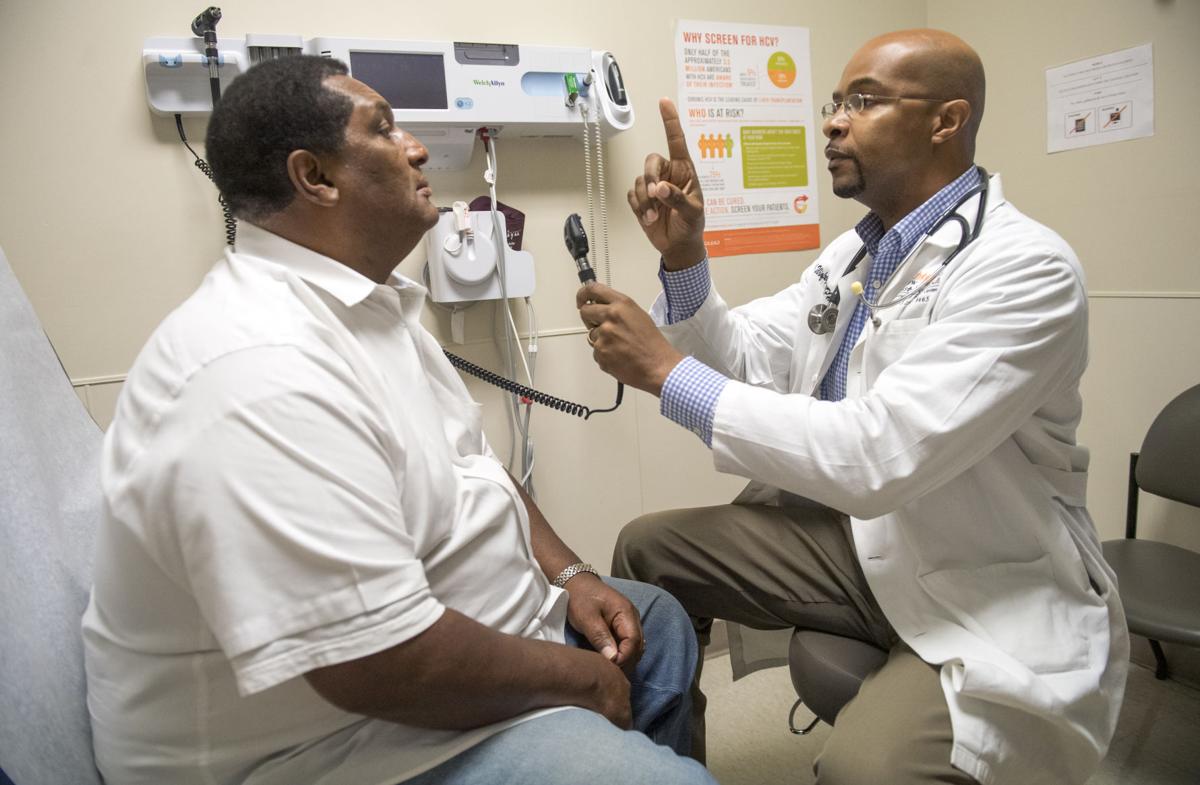New Orleans Doctor Honored as a 'Catalyst for Change' by Cancer Research and Screening Group

- BY LESLIE CARDÉ | Special to The Advocate
Staff photo by CHRIS GRANGER
When Tulane University handed off its New Orleans East clinic to be run as a community nonprofit in 2011, Dr. Keith Winfrey, a 1994 Xavier University of Louisiana graduate, set a goal.
Winfrey, the chief medical officer of the renamed NOELA Clinic, wanted to make sure that his patients were screened for colorectal cancer, a top cancer killer in the United States and one that can be detected early with a next-generation home test.
Every year more than 600,000 Americans will die of cancer, according to statistics compiled by NIH and the National Cancer Institute. Lung cancer is the deadliest. One reason: There's no cost-effective early screening for lung cancer.
Colorectal cancer, on the other hand, can now be detected early with a simple home test, which gives patients an excellent chance of survival.
If the screening results are positive, a colonoscopy is recommended as a follow-up. But it's still the third-deadliest cancer. Many patients aren’t aware of these screening procedures.
So Winfrey made it his mission to get his patients informed and screened.
The clinic was opened by Tulane in 2008 in the aftermath of Katrina, when returning residents needed access to quality primary and preventive care. When the clinic was turned over to the community, it screened 3 percent of its patients for colorectal cancer.
By the end of last year, the clinic had screened an astounding 80 percent of its patients.
The newer colorectal diagnostic tests are different from what many may be familiar with. The Hemoccult II test was the industry standard, but required three different stool specimens and mandated that patients modify their diets before testing — avoiding red meat, fruit and vegetables. With the newer FIT (Fecal Immunochemical Test) only one specimen is necessary, with no dietary modification and more accurate results.
“We discuss with patients the importance of getting screened, and we have FIT screening kits on hand,” said Winfrey, who's also a professor at Tulane School of Medicine.
“They can provide specimens in the office or take the test home and mail it in. Many of our patients were initially reluctant as they weren’t familiar with the test, or they were afraid of what they might find.”
Winfrey’s persistence is the reason he was one of only four doctors in the nation to receive a Catalyst For Change Award at ceremonies in New York City in May. The C2 recognizes physicians who are at the forefront of cancer research and who bring awareness to underserved communities.
Winfrey grew up in a suburb of Atlanta and came to New Orleans in 1990 to attend Xavier University as a pre-med student. Growing up. he saw major disparities in health care between haves and have-nots, and he decided to make underserved communities his priority.
After Xavier, Winfrey graduated from Tulane University's medical school and ultimately became a professor there.
The clinic in New Orleans East serves a population of largely Vietnamese, African-American and Hispanic patients. One patient says the screening that led to his colonoscopy probably saved his life.
“Generally, I’m not that trusting, but Dr. Winfrey told me how important this was, so I took the FIT last year,” said patient Sidney Rayfield. “The screening indicated I had some serious issues, so I was referred to a gastroenterologist who did a colonoscopy, and found four polyps throughout my colon. The largest one was 11 millimeters. Dr. Winfrey later told me anything over 10 mm is at a definite risk for becoming cancerous.”
There is another colorectal screening test called Cologuard, which is a DNA test. This test is a little more involved and expensive.
“Cologuard consists of two tests applied to a single stool specimen — the FIT and a DNA test. The FIT kit doesn’t include a DNA test, but it is considered an excellent primary screener, which is why we use this here in our clinic.”
The FIT is under $50, while Cologuard runs around $600.
It's recommended that the public get a doctor's advice, based on their own personal medical information, of which is right for them, and what their insurance covers. FIT screeners are over-the-counter, whereas the Cologuard test requires a prescription.
As a C2 Catalyst For Change award winner, Winfrey received $50,000 in prize money, sponsored by AstraZeneca and Scientific American, to be donated to the nonprofit of his choice that is working to fight cancer.
The award will be donated — where else? — to the nonprofit NOELA Community Health Center, as it continues its work fighting cancer.